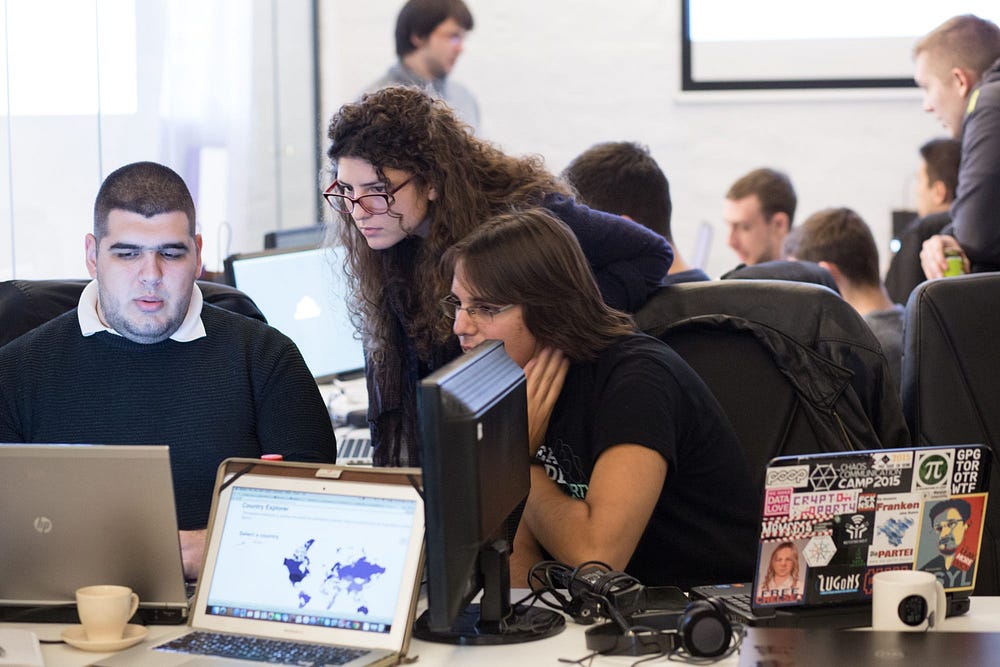If you wonder “What am I going to do in the future?” one possible answer is: computer programming. Computer programming is what’s going to make the (startup) future what it is. In order to empower people to control the future, what we have to do now is to teach them to code. I have traveled the world in search of inspiration, in search of a medium that would help me change what is to come.

When I came back home, I decided to start Zamphyr a startup which would be the next generation of computer science schools. Our goal is to tailor education to what schools need to be in order to give everyone a fighting chance in this new digital world of ours. That’s why Zamphyr stands for freedom. Freedom from buildings, freedom from location, freedom from limits imposed by a rigid curriculum. It is truly an agile, ever-evolving platform that provides continuous learning. To do that, I had to re-think about where I am. Question what education is now, and finally what change I wanted to impose.
I come from a place called “Europe invisible”, which you probably can’t on a map. This is the place that’s going to bring the next big innovation to the world. Not being in “the best position” can be a huge motivation when innovating. A Serbian scientist has given us the alternating current generator (hint: electricity). An Estonians gave us Skype (hint: the blue thing that never works well). A good deal of convictions that go into your product are the ones of your environment. One can argue that not being comfortable is the way to innovate more.
Remote-first is a freedom movement
There are many things that are remarkably similar when we’re talking about redesigning education and redefining how we work. I believe in expanding the experience pool. Giving the freedom to explore the world to those that are a foundation of your company, expands your talent pool. It expands your experience pool as well. Just imagine how much those people experienced and learned in their quests. Now you are forging that into the core of your venture.
Learning is about freedom, something that education today fails to acknowledge. From day one I knew we needed to build something that doesn’t constrain or limit, but rather directs and advises. Education today is not fit enough to sprint alongside innovation. Basically, to teach the world to code we need a shift in culture, the same thing happening to work now. Build not what people say they want, but what you learn they need.
Teaching what doesn’t exist yet
About a year ago, I was in Moscow when I overheard the question: “How do we teach what doesn’t exist yet?”. Startups, as well as a schools, boil down to this question of uncertainty.
When building a school we have had to figure out how to teach people what isn’t there yet. When building a startup you have to figure how to learn things that you don’t even know that you don’t know. The unknown unknowns are why we chose to build everything together with people who know what’s missing. Make sure to surround yourself with people that can do what you can’t, and complement your abilities.
The issue with formal education
We are looking for an “augmented interaction and bot developer”. Now try reading that to a recent graduate. The premise is that we want to question the interaction between the school and the student. Make it seamless, leverage bots to make this new medium conversational. On top of it all, we want to use the technology so the school would fit into students’ lives not the other way around. It’s imperative that education teaches people the value of innovation. Currently, it does not. Formal education has not prepared students for innovation and out of the box thinking. As Twain said:
Don’t let education interfere with your learning.
You can read all over the web how a startup should solve real problem. In the words of people from Y Combinator (in their Request for Startups):
“If we fix education, we’ll be able to fix everything else.”
What we don’t (or do not fully) know is how do we escape the box we are all trapped in?
The answer is: question everything.
MVP of a startup school
With all the experience behind us, we’ve set up principles that will guide us through this endeavor. At the beginning, you certainly don’t know what the MVP or the end result will look like. You’ll have to set principles and goals. If you have a picture of an app in your head — kiss it goodbye, it will soon have to change.
We envisioned affordability, availability, we’ve set new goals toward evaluation, the value of knowledge, didactics and we’ve taken the holistic approach. At the end, students would feel the transformation in the knowledge that they get. Not in the medium they’re getting it through. We knew we were going to end up with a web-based platform.
The availability of knowledge to all of those connected to the internet is a great step forward from offline education. That and being in one place and one point in time.

Now, I didn’t want this to be just another course platform = pay, watch, take a test, leave. Bootcamps and academies fail people because education can’t be instant. Video courses are not the way we wish to see education go. I believe that the future of learning depends on changing didactics, interaction, methods and integrations in a way that is suitable to the technology age. These kind of thoughts are going to be in your head when building that first version of you own vision. Your “revolution beta”. Make a meaningful change. Keep in mind you need to make it work first, then make it better.
The easiest trap to fall into is over-engineering. Bureaucracy and startups don’t mix. Your MVP should be as lean as possible. You need to move forward. The only way to do that is by giving the tools to the people, which would propel them forward. What we envisioned for our MVP is a single goal: To teach people better by applying our principles. Not an easy thing to do at all. But we did it. And people are saying: “Thank you for existing.”, and “You’d be insane to learn anywhere else”. We did it.
Future of learning
What’s the future of learning? I’d like to believe in a technocratic collective rather than rigid bureaucracies, institutions, and degree programs. We think that Zamphyr is the next evolutive step in computer science education, and we envision it as a global CS school.
Working on a startup is pretty much a school on its own. The more you do it, the more you become this new person shaped by new experience. Don’t fear the unknown unknowns. Building and creating is natural. Be what you need to be to embody your vision.



